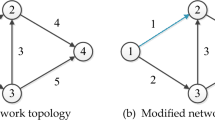Abstract
Energy security planning is fundamental to safeguarding the traffic operation in large-scale events. To guarantee the promotion of green, zero-carbon, and environmental-friendly hydrogen fuel cell vehicles (HFCVs) in large-scale events, a five-stage planning method is proposed considering the demand and supply potential of hydrogen energy. Specifically, to meet the requirements of the large-scale events’ demand, a new calculation approach is proposed to calculate the hydrogen amount and the distribution of hydrogen stations. In addition, energy supply is guaranteed from four aspects, namely hydrogen production, hydrogen storage, hydrogen delivery, and hydrogen refueling. The emergency plan is established based on the overall support plan, which can realize multi-dimensional energy security. Furthermore, the planning method is demonstrative as it powers the Beijing 2022 Winter Olympics as the first “green” Olympic, providing both theoretical and practical evidence for the energy security planning of large-scale events. This study provides suggestions about ensuring the energy demand after the race, broadening the application scenarios, and accelerating the application of HFCVs.






Similar content being viewed by others
References
Southall, G.D., Khare, A.: The feasibility of distributed hydrogen production from renewable energy sources and the financial contribution from uk motorists on environmental grounds. Sustain. Cities Soc. 26, 134–149 (2016)
Dubois, G., Sovacool, B., Aall, C., Nilsson, M., Barbier, C., Herrmann, A., Sauerborn, R.: It starts at home? Climate policies targeting household consumption and behavioral decisions are key to low-carbon futures. Energy Res. Soc. Sci. 52, 144–158 (2019)
Tseng, C., Chau, C.: Personalized prediction of vehicle energy consumption based on participatory sensing. IEEE Trans. Intell. Transp. Syst. 18(11), 3103–3113 (2017)
Haines, A., Smith, K., Anderson, D., et al.: Policies for accelerating access to clean energy, improving health, advancing development, and mitigating climate change. Lancet 370(9594), 1264–1281 (2007). https://doi.org/10.1016/S0140-6736(07)61257-4
Revankar, S., Kalkhambkar, V.: Grid integration of battery swapping station: a review. J Energy Storage 41, 102937 (2021)
Kınay, Ö., Gzara, F., Alumur, S.: Full cover charging station location problem with routing. Transp. Res. Part B Methodol. 144, 1–22 (2021)
Yang, M., Chen, Y., Wang, C., et al.: A stochastic multi-objective optimization decision model for energy facility allocation: a case of liquefied petroleum gas station. Clean Technol. Environ. Policy Issue Part A 22, 389–398 (2020)
Miralinaghi, M., Lou, Y., Keskin, B., et al.: Refueling station location problem with traffic deviation considering route choice and demand uncertainty. Int. J. Hydrogen Energy 42(5), 3335–3351 (2017)
Miralinaghi, M., Keskin, B., Lou, Y., et al.: Capacitated refueling station location problem with traffic deviations over multiple time periods. Netw. Spat. Econ. 17, 129–151 (2017)
Li, Y., Cui, F., Li, L.: An integrated optimization model for the location of hydrogen refueling stations. Int. J. Hydrogen Energy 43(42), 19636–19649 (2018)
Akhoundzadeh, M.H., Raahemifar, K., Panchal, S., Samadani, E., Fowler, M.: A conceptualized hydrail powertrain: a case study of the union pearson express route. World Electric Vehicle Journal 10(2), 32 (2019). https://doi.org/10.3390/wevj10020032
Gurz, M., Baltacioglu, E., Hames, Y., Kaya, K.: The meeting of hydrogen and automotive: a review. Int. J. Hydrogen Energy 42(36), 23334–23346 (2017)
Garcia-Segura, S., Qu, X., Alvarez, P., et al.: Opportunities for nanotechnology to enhance electrochemical treatment of pollutants in potable water and industrial wastewater—a perspective. Environ. Sci. Nano 7(8), 2178–2194 (2020)
Babar, A., Ali, Y., Khan, A.U.: Moving toward green mobility: overview and analysis of electric vehicle selection, pakistan a case in point. Environ. Dev. Sustain. 23, 10994–11011 (2021)
Zhou, Y., Park, S.: The regional determinants of the new venture formation in China’s car-sharing economy. Sustainability 13(1), 74 (2020). https://doi.org/10.3390/su13010074
Mas, A., Bg, A., Oa, A., et al.: Comparative study of energy management strategies for hybrid proton exchange membrane fuel cell four wheel drive electric vehicle-sciencedirect. J. Power Sources 462, 228167 (2020). https://doi.org/10.1016/j.jpowsour.2020.228167
Yeerkenbieke, G., Chen, C., He, G.: Public perceived effects of 2022 winter olympics on host city sustainability. Sustainability 13(7), 3787 (2021)
Gallo, M., Marinelli, M.: Sustainable mobility: a review of possible actions and policies. Sustainability 12(18), 3787 (2020). https://doi.org/10.3390/su13073787
Chao, W.A., Jz, A., Zx, B.: Comparative analysis of urban ecological management models incorporating low-carbon transformation. Technol. Forecast. Soc. Chang. 159, 120190 (2020). https://doi.org/10.1016/j.techfore.2020.120190
Jouhara, H., Abnieńska-Góra, A., Khordehgah, N., et al.: Latent thermal energy storage technologies and applications: a review. Int. J. Thermofluids 5–6, 100039 (2020). https://doi.org/10.1016/j.ijft.2020.100039
Mckay, M.D., Beckman, R.J., et al.: A comparison of three methods for selecting values of input variables in the analysis of output from a computer code. Technometrics 42(1), 55–61 (2000). https://doi.org/10.2307/1271432
Acknowledgements
The authors thank the support of colleagues from Beijing Transport Institute.
Author information
Authors and Affiliations
Corresponding author
Ethics declarations
Conflict of interest
On behalf of all the authors, the corresponding author states that there is no conflict of interest.
Additional information
Academic Editor: Zhen Wu
Rights and permissions
About this article
Cite this article
Wang, P., Xue, Q., Yang, J. et al. Energy Security Planning for Hydrogen Fuel Cell Vehicles in Large-Scale Events: A Case Study of Beijing 2022 Winter Olympics. Automot. Innov. 5, 209–220 (2022). https://doi.org/10.1007/s42154-022-00183-3
Received:
Accepted:
Published:
Issue Date:
DOI: https://doi.org/10.1007/s42154-022-00183-3




